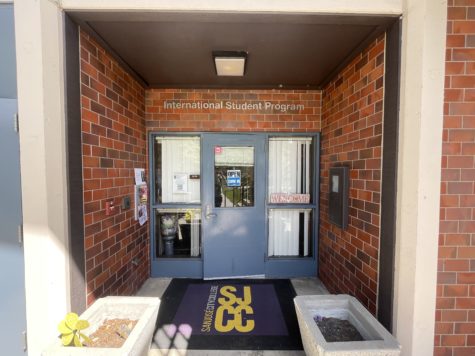Students deserve privacy & security
How to protect your electronics, data and privacy
November 1, 2016
In February of 2013, The Times published an article titled, “In search of a more secure campus.” It covered the removal of payphones from campus, reduced police office hours and a gunman on campus. These days, crime on campus has significantly dropped, most of us wouldn’t even think of using a payphone and we see police all the time. Things have changed for the better.
However, we should still be concerned about security and privacy.
“Snowden” the Live Q&A Fathom Event, conducted by Anatoly Kucherena author of “Time of the Octopus,” opened nationwide on Wednesday, Sept. 14. The Fathom.com unique platform allowed producer Oliver Stone, cast members Shaileene Woodley and Joseph Gordon-Levitt in New York City to interact with Edward Snowden in Moscow.
Whistleblower and former NSA contractor, Snowden’s main concern was regarding opening the dialogue on what privacy actually means and how you can protect it.
This column expands that dialogue to include two kinds of electronic theft: invasion of privacy and iCrime. Invasion of privacy involves large entities such as governments, employers and even colleges opening your webcam and listening through your microphone without your permission. iCrime is the actual theft of physical electronic devices between regular citizens.
Protecting from Invasion of Privacy
Snowden offers several tips for people to protect themselves from privacy invasions online. (See Pop out)
Tape over your webcam with a Band-aide. The cotton protects the lense
Use cotton balls under your band-aide over your microphones
Hardware that is hard to hack – Apples and Blackberries
Encrypt your devices from day one
Get a Password manager and never reuse a password
Ad Blockers
Buy cellphones without sim cards
Place cellphones in microwaves when you are home not using them
Get phone apps and emails that encrypt your calls, text messages and emails
www.StartPage.com “the world’s most private search engine”
www.StartMail.com “make it easy for you to protect yourself from unwanted surveillance”
Protecting from iCrime
The local District Attorney Jeffrey Rosen says, “Personal electronics are being stolen daily” from “backpacks, cars, café’s and even from the home of the late Steve Jobs.” In his video, “The Epidemic of iCrime,” he further says that “according to the FCC, cellphones are stolen one out of every three robberies nationwide.”
Deputy District Attorney Tom Flattery further adds, “what makes iCrime different from regular crime is the “loss of data and personal information on each device.” Many people set up “easy access to their bank accounts or one-click access to their email account. Once a crook has access to your email account, they are a few short steps away from taking over your on-line banking records, your PayPal account” “they can take your money through identity theft.”
To sum up the iCrime situation Lieutenant Zachary Perron of the Palo Alto Police Department has “several recommendations for things you can do to protect your devices:
“Enable the GPS tracking feature, such that, if it is stolen law enforcement may be able to work with the air carrier to locate, retrieve and recover that item.”
“Note the serial number of all your electronics” for your records
“Do not try to recover stolen items yourself … people do not have the same training that law enforcement officers… they don’t have the same experience officers do in dealing with criminals… it absolutely might be dangerous for them.”
The District Attorney Rosen said, “we hope this information will help you better protect your personal electronics and guard your priceless private information.”
Protecting your Social Media
During the live Fathom event, Oliver Stone took it one step further by including social media and saying, “How do you balance Social Media and Privacy?” You remember, “I am in charge of what content is put out there.”
And that is the real KEY to my entire column.
Remember you are responsible for what you put out there.
As a SJCC student, as an administrative assistant temp, and as an electronic book editor, this Times reporter can tell you that data theft, invasion of privacy and iCrime are very real. I have personally dealt with cyber-hackers, life-hackers and iCriminals on a very unpleasant, intimate level. The single best thing you can do is protect yourself by being proactive:
Encrypt your phone before you start using it
Encrypt your email accounts
Download a “Password Generator” app from Google Play or iTunes
Never use information from your life for a password. No birthdays, no pet names, etc.
Buy backpacks and purses that lock or have butterfly wing clasp that lock
Buy iPhones, iPads and MacBooks that use your fingerprint as a password
Never use your personal Facebook account for class assignments
Do Not sign into your Facebook and email accounts when at work
Keep your personal data and your school data on completely different thumb drives
Special Advice for Domestic Violence or Rape survivors:
Do NOT enable your GPS phone tracking system
Never attach your phone number to your email account for tracking purposes
Learn how to turn off the “Check-in” feature in your Facebook profile
Your attacker can use all these features to find you or discover your habits and routines. Remember safety first.
In conclusion, let me remind you that your privacy should be your number ONE concern, yet every employer will benefit from your due diligence. As you move out into the Silicon Valley to work for future employers, excellent electronic safety habits will assure them that you are protecting their best interest, their trade secrets and their equipment. So begin good practices today, for a better tomorrow.
The last thing you want is to be the guy who worked for ING and had his laptop stolen. But that’s another story…











